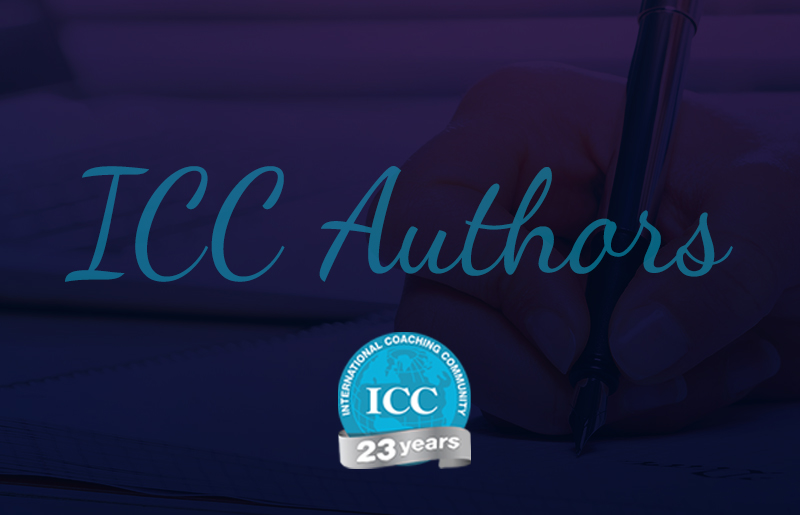ICC Authors
We invite you to read these insights from our Trainers around the world. They are part of our ever-growing community, sharing thoughts that reflect their experiences and inspire us to keep learning, growing, and becoming better coaches and individuals.
In addition to articles from Alexandra Niño (PER), Daniel Álvarez Lamas (ESP), Alejandro Feiges (ARG), Marcela Parga (ESP), Sonia Colombo (DOM), Karina Pittini (URY/CHL), Raechel Ford (NZL), Ronald Granthon (PER), Luis Alfredo Pulido (COL), Virginia Pardo Camacho (COL), Guillermo Mendoza (USA), Manolo Sarmiento (COL), Kasia Radii (POL) and Piotr Radii (POL), we will have more excellent contributions from ICC Trainers in the coming weeks.
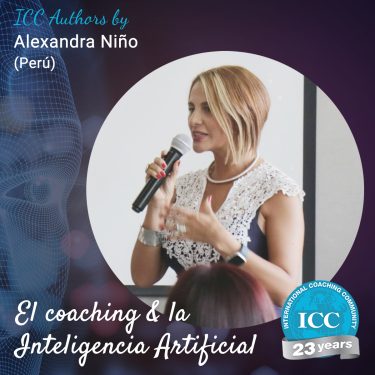
Coaching & AI
by Alexandra Niño, ICC trainer from Peru
Coaching can be very effective in developing skills that cannot yet be fully replicated by artificial intelligence (AI). Some of these skills include:
- Empathy and emotional understanding: Although AI can analyze data and patterns, it still lacks the ability to genuinely empathize and understand human emotions.
- Interpersonal communication skills: Coaching offers opportunities to improve face-to-face communication, active listening, and the ability to build personal relationships—skills that are essential in many human contexts and cannot be matched by AI.
- Creativity and innovative thinking: While AI can generate ideas from existing data, it still cannot match the human capacity for creativity and generating innovative ideas.
- Self-awareness and self-management: Coaching promotes personal reflection, self-knowledge, and the development of self-management skills, which are essential for personal and professional growth.
- Adaptability and flexibility: Although AI can adapt to certain predefined contexts, the ability to adapt to new and changing situations is a fundamental human skill that can be developed through coaching.
- Conflict resolution: Coaching can help people develop skills to resolve conflicts constructively, understanding different perspectives and seeking solutions that benefit all parties involved.
- Leadership and motivation: Through coaching, individuals can improve their ability to inspire and motivate others, as well as develop effective leadership skills that foster team growth and success.
- Ethical decision-making: Coaching can provide a space to reflect on personal and ethical values, as well as develop skills to make difficult decisions that consider not only practical outcomes but also moral and social impacts.
- Resilience and stress management: Coaching sessions can help individuals strengthen their ability to handle stress, adapt to adversity, and recover from challenges more effectively, thereby promoting emotional resilience.
- Networking and collaboration: Through coaching, individuals can improve their skills to establish and maintain strong relationships, as well as collaborate effectively in multidisciplinary teams, which is crucial in work and social environments.
Coaching focuses on comprehensive human development, addressing emotional, social, and cognitive aspects that are still beyond the reach of artificial intelligence in its current form.
Alexandra Niño is an ICC trainer from Peru, an expert in purpose, creativity, possibility, disruption, and also in AI in the field of Human Development.
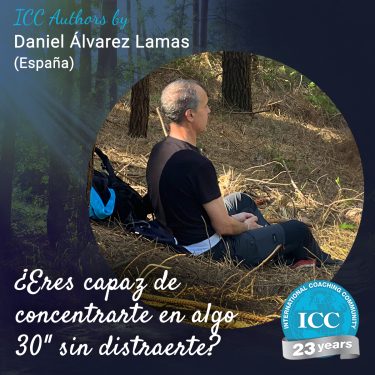
Are you able to concentrate on something for 30 seconds without getting distracted?
by Daniel Álvarez Lamas, ICC trainer from Spain
If you want to develop your #attention, a crucial skill in today’s world, it’s easier than you think! Try these simple steps to train it daily:
1. Take 10 minutes for yourself. Smile and immerse yourself in the present moment. Enjoy it.
2. Connect with your breathing and feel each part of your body, from your feet to your head.
3. Notice how your breath flows smoothly through your nostrils.
4. Observe 10 or 21 breaths, repeating if you have time.
5. Finish with a smile and thank yourself for this moment of calm and peace.
When would you like to do it?
Daniel Álvarez Lamas is an ICC trainer from Spain, an expert in mental training, meditation, life coaching, high performance and well-being. Founder of the Ben Pensante Institute.
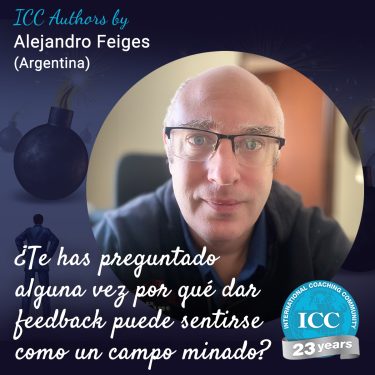
Have you ever wondered why giving feedback can feel like navigating a minefield?
by Alejandro Feiges, ICC trainer from Argentina
Feedback is vital in any professional setting, especially for leaders. But how can you ensure that your feedback is not only heard but also received and applied effectively?
The GROW model, a great formula for effective feedback:
1. G: Goal – What is your objective with this feedback?
2. R: Reality – What is the current situation?
3. O: Options – What improvement alternatives can be considered?
4. W: Will – What commitment to action can be established?
This model not only structures your feedback conversations but also makes them participative and focused on mutual growth. By adopting the GROW model, you create a safe space for dialogue and continuous improvement, ensuring that each feedback session is a step towards success.
Alejandro Feiges is an ICC trainer from Argentina, an expert in Executive Coaching, Team Coaching, team development and facilitation, Soft Skills development for leaders, and Coaching Supervision and Mentoring.
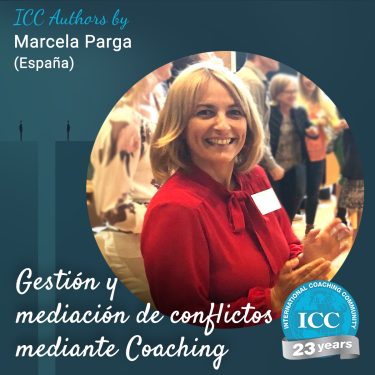
Conflict Management and Mediation through Coaching
by Marcela Parga, ICC trainer from Spain
Conflict is present in our lives and in our relationships.
No two people are alike, so there are no identical ways of understanding life, communicating, or relating.
Disagreements and misalignments are absolutely normal and necessary; however, we have been taught to interpret conflict situations as problems that need solving, when in reality, they are just “scenarios” from which we can learn and evolve in terms of our thinking, behavior, and even understanding of our emotional state.
By combining Coaching with Mediation, we can train communication and emotional management skills so you can transform your own conflicts and become an authentic facilitator. This way, you can help others experiencing conflict to listen, communicate, and understand each other as they never have before.
Conflict Management and Mediation through Coaching operates from two scenarios to facilitate its integration:
1. Internal: Transforming your own conflicts
2. Facilitator: Facilitating the transformation of others’ conflicts
I invite you to explore these two aspects within yourself:
• How do you communicate with yourself in conflict situations?
• How do you help others when they are in conflict with someone?
Marcela Parga is an ICC trainer from Spain, an expert in Conflict Mediation through coaching, and in integrating coaching tools into any profession.
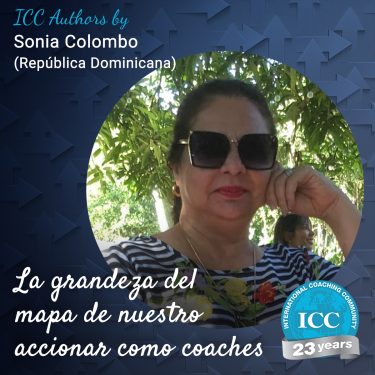
Have you ever wondered about the greatness of the map of our actions as coaching professionals?
by Sonia Colombo, ICC trainer from the Dominican Republic
Let me tell you:
A little over 20 years ago, I began my training, my career, and lifelong learning as a coach. At that time, I understood that BEING a Coach was about helping others build that desired idea of being better people. I still believe this, but today I see great opportunities to expand my presence in a world of needs, where the ethical framework and professionalism allow me to support the awakening of consciousness, transform realities, and enable others (people, teams, and organizations) to learn how to learn!
My understanding of this new reality of Coaching has been shaped by my active practice of being an “explorer” of knowledge and other practices, which allow me to ask a very powerful question: “What would happen if I shared this learning?”
This practice has allowed me to expand my range of approaches and resonance, being generous with knowledge. My clients enjoy listening to other varied, diverse, and sometimes disruptive melodies.
Another resource to expand my map of BEING a Coach is to enrich and sharpen the awareness that my environment has a high need to learn something that is there, but they are not seeing it… or worse yet…, they believe they cannot learn or be different. As a coach, I generate possibilities to awaken to that reality!
Individually, in teams, and in organizations, our BEING a Coach becomes great. We become highly impactful in the lives of our clients when, clearly, intentionally, and with respect for the person, we support the construction of broader, more diverse worlds that can accompany others in building more inviting and brighter futures. But I do not lose sight of the fact that this is built from the change in our own beliefs to be able to support the change in other beliefs. This is your challenge and the challenge for everyone!
Sonia Colombo is an ICC trainer from the Dominican Republic. She follows a path that reinforces the work of consciousness and beliefs, the construction of individual and collective learning, and the transformation of traditional education models, which is the area she is currently focused on.
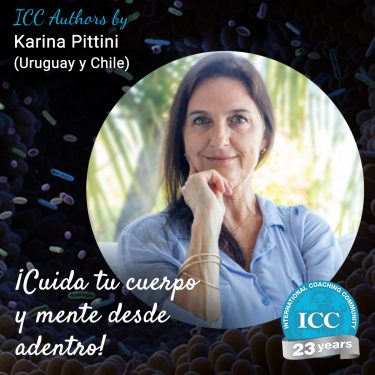
Take care of your body and mind from within!
by Karina Pittini, ICC trainer from Uruguay and Chile
Did you know that your body hosts more bacteria than cells? Incredible but true! These bacteria, known as the microbiota, are essential allies for your physical and mental health.
Dr. Dolores de la Puerta, an expert in microbiota, reveals that we are as microbial as we are human. The gut microbiota, in particular, is a fascinating ecosystem composed of billions of microorganisms living in symbiosis with us.
When this community of bacteria functions harmoniously (eubiosis), we enjoy mental, emotional, and physical health. On the other hand, if there is an imbalance (dysbiosis), problems such as inflammation, chronic diseases, and even mental issues can arise.
What can we do to take care of our microbiota?
– Healthy eating: Nourish your body with foods rich in fiber, prebiotics, and probiotics.
– Regular exercise: Get moving! Physical activity benefits your gut microbiota.
– Stress management: Stress can negatively affect gut bacteria. Practice relaxation techniques such as yoga or meditation.
– Quality sleep: Good sleep is essential for overall health and your microbiota.
– Avoid excessive sugar and processed foods.
Remember! Your health is in your hands. Take care of your microbiota and enjoy a fuller, healthier life.
Share this post with your friends and family so they can also take care of their microbiota!
Karina Pittini is an ICC trainer from Uruguay and Chile, Director of the HCC Academy. She is a psychologist, coach, columnist, and speaker. She is pursuing a master’s degree in Psychoneuroimmunoendocrinology and is an inspiring leader in human and organizational development. Passionate and committed to people, health, well-being, happiness, and development.
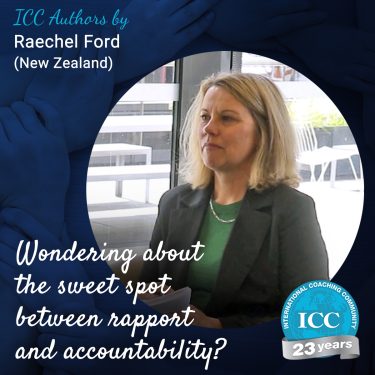
Wondering about the sweet spot between rapport and accountability in coaching?
by Raechel Ford, ICC trainer from New Zealand
Rapport lays the groundwork for deep, transformative chats with your clients. It’s like a warm hug, setting the stage for trust and openness. But let’s not stop there. As coaches, we also need to bring in some gentle nudges towards action. The most effective coaches balance warmth with accountability and even a gentle push, to help clients turn intentions into action.
So, how do we strike that balance? Accountability kicks in towards the session’s end with practical questions like “What’s your next step?” or “How committed are you?” It then rolls into the next session with us following up on what has been achieved, keeping the momentum alive.
To keep the rapport flowing, John Polemis suggests asking a simple yet powerful question: “How can I support your goals while holding you accountable?“
Raechel Ford is an ICC Trainer from New Zealand.
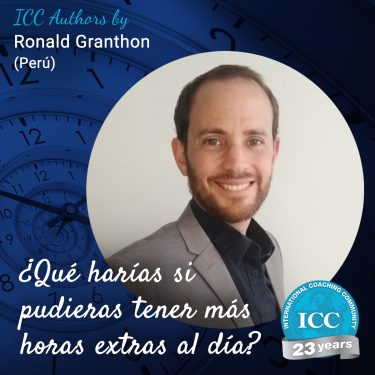
What would you do if you could have more extra hours in the day?
by Ronald Granthon, ICC trainer from Peru
Can you imagine having a 30-hour day?
It’s very common to hear people say they don’t have enough time to do the activities they’d like to. It’s inevitable to feel that time slips through our fingers, leaving us with a to-do list and unfulfilled dreams. It’s possible, dear reader, that you also identify with the feeling that there are never enough hours in the day for everything you want to accomplish.
Take a moment to reflect: What would you do if you had 4 or 6 extra hours in your daily routine?
Surely, there are various activities you’d like to undertake. But is it really impossible to have a 30-hour day? Surprisingly, the answer is no!
And furthermore, the solution is within your reach!
Studies conducted by experts like Olivero, Bane, and Kopelman in the United States, as well as research carried out by the consulting firm Crecimiento Sustentable in Mexico, reveal that it’s possible to significantly increase our productivity. How? Through training and coaching.
According to these studies, job training can increase productivity by 22%, but when combined with coaching, this percentage skyrockets to 88%! Additionally, it has been proven that happy people are 88% more productive than those who are not.
What does this 88% increase in productivity mean in practical terms? Imagine that with just 8 hours of work, you can achieve the same as you would in 15 hours. That’s equivalent to gaining 7 additional hours of work in a single day! In other words, with just 4 hours of work, you could accomplish what you would normally do in almost 8 hours. Plus, you would be in a better mood to interact more positively with your loved ones and work team.
So, how can you start gaining more time for yourself, your work, and your loved ones? The answer lies in following a coaching process that helps you improve your motivation, happiness, and productivity. Imagine having more hours in your life to dedicate to what you desire most!
If you’re ready, contact me. I am here to help you discover the potential within you and start an exciting journey to transform your time and your life.
Ronald Granthon is an ICC Trainer from Peru, an expert in Executive Coaching, Leadership, Purpose, Happiness, and Productivity. He enjoys working with Leadership and the development of soft skills, Coaching in the training of people, and Belief Transformation. Founder of Gran-Pro Coaching.
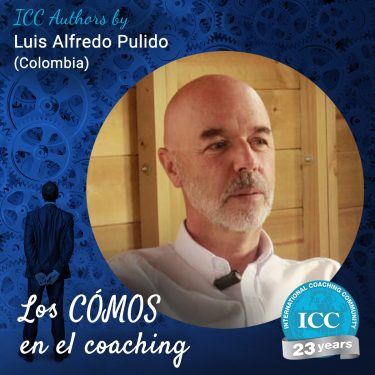
The HOWs in Coaching
by Luis Alfredo Pulido, ICC trainer from Colombia
The practice of coaching is becoming increasingly challenging and demanding, pushing us to continually train and update ourselves.
Is our basic knowledge of coaching sufficient to face these challenges?
I confess that when I started my journey as a coach, I wanted to strictly adhere to the methodology I had learned and apply it by the book. Throughout my coaching career, I often found myself facing the dilemma of seeing my client (coachee) blocked when they discovered what to do… but not knowing HOW to do it!
I was really frustrated by the impotence I felt as a coach when I saw my client stuck, eager to resolve the situation but lacking the tools to do so, while I had those tools. I often wondered if, once my client discovered what they wanted to do, giving them a tool to achieve it would interfere with their process. Was it inappropriate? Did it go against the coaching code of ethics?
Some advocate for the purity of coaching and consider the use of complementary tools or methodologies inappropriate, arguing that these tools could be directive and invasive in the process.
It made more noise for me to know, understand, and manage my own toolbox and how useful they had been for my own growth processes.
So, one day I took the plunge and started using some tools within the coaching processes. I immediately verified that providing a tool to my client that allowed them to advance in their process was not only useful and beneficial for them but was also correct and did not interfere with their free will. It was just a means to use in an action previously established or discovered by them.
Nowadays, I use tools such as:
– Lego Serious Play, which allows the client to build a model and express themselves through it, answering the question posed.
– Visual Thinking with Open Cards, which I use, though there are many more options on the market. These cards give the client a wide range of alternatives; by seeing so many concepts and ideas that they might not remember at the moment, they can choose what makes the most sense to them and decide what actions to take.
And others, such as templates, mind maps, graphics, NLP, Agile methodologies, and Facilitation, among others, to speed up the client’s processes and actions.
The results are great: they accelerate the process, facilitate actions, shorten the timeframes, and best of all, the client sees results in a shorter period.
My colleague Sara Bartol from Spain contributes these wise and appropriate words to this article:
“I invest valuable time explaining, in the Coaching Agreement with the client, my way of working. I contextualize what coaching is and the difference with other disciplines. I clarify that we are going to start a coaching process and ask for their approval to use other complementary techniques when I believe they can add to the process.”
Dear colleague, I encourage you to step out of your comfort zone, explore the world, and learn new methods and methodologies that allow you to leverage the coaching process and the growth of your client and yourself.
Luis Alfredo Pulido is an ICC Trainer in Colombia. He is an expert in leadership issues with his brand LIDERHAZLO.
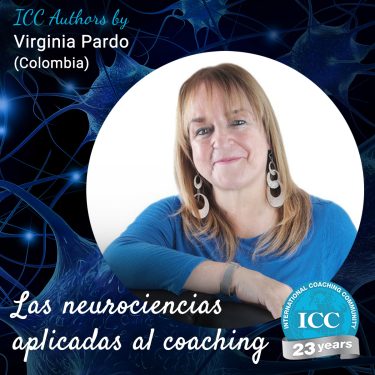
Practical Neuroscience applied to Coaching
by Virginia Pardo Camacho, ICC trainer from Colombia
Thanks to technology, a new professional discipline has emerged: neuroscience, which is contributing a lot to the academic world, to practical life and even better to Coaching, with Joseph O’Connor being my mentor and pioneer in the application of Applied Neuroscience. to Coaching, whose objective is to increase credibility and respect for the coaching profession and better results by having the science behind the processes.
It is understanding the being but also the wonderful mind of it. If we know how the brain works, we know and understand ourselves better and, consequently, our coachees or clients depending on the profession. We work with objectives, beliefs and values, the three pillars of coaching and we have a successful methodology, but we can go further. Our brain is a powerful tool that can work in our favor if we learn to direct it properly, it is continually transforming itself, a process known as neuroplasticity, since new neuronal connections are formed through through experiences and learning. The greatest driver of neuronal change is behavior, however, we are not aware of it and therefore we do not direct the transformation.
We know that everything is formed in the brain and that is where changes must be made consciously. Since the powerful question is the best coaching tool, have you ever wondered how habits are formed and changed? How are decisions made? How do we remove power from fears? Which neurotransmitters are released according to our thoughts and emotions? predominant?, how our behavior is transforming our brain and why is it not always in our favor?, what triggers our creativity and What blocks it and therefore affects problem solving? How does the reward system work for achieving objectives?… among others.
In order to know ourselves at another level, at a deeper level, a need arises to delve into that being from science, without having to become experts but simply understand ourselves. The answer to this need is the fusion of two professional disciplines: Coaching and Neurosciences. In the same way that we nourish our being and take care of our body, it is also important to know and nourish our brain, which is not an entity isolated from our body.
The success of coaching is based on achieving objectives through conscious processes, expressing it in a very simple way; It is taking the Coachee from the present state to the desired state. However, these processes could be even more profound, conscious, effective and productive, if they involve neuroscience. From my personal and professional experience in the application of science to my professional processes of individual, executive or team coaching; or my training programs, I observe that the responsibility, commitment, action, flow and empowerment of that client or Coachee or team become more conscious, tangible, agile, effective and sustainable.
I am certain that having the science behind our professional processes generates a quantum leap in the world of coaching, it makes a great difference of which as ICC we would be proud, since it is a great contribution to the world of coaching, More prepared coaches, deeper and more effective coaching processes, more satisfied and expanded coachees.
We can dare more!
Virginia Pardo Camacho is an ICC trainer from Colombia, Neuro Trainer and Lambent Strategic Partner for LatAm.
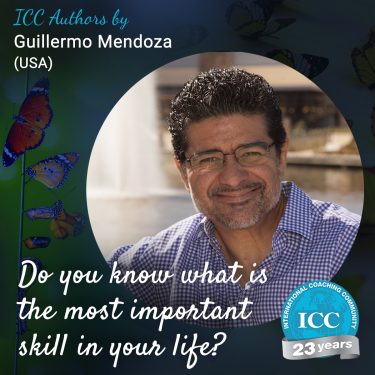
Do you know what is the most important skill in your life?
by Guillermo Mendoza, ICC trainer from the USA
It is one that you have practiced since you were born and maybe throughout the years has become easier or harder. It does not matter if you are an entrepreneur, manager, artist or teacher. No matter what is your profession and your professional or personal skills no other is going to be as important as this one.
The most important skill in your life is your ability to TRANSFORM YOURSELF and help others to TRANSFORM. And no matter what your activity is, this skill is the one that will give you the best performance results.
Heraclitus said it more than 2,500 years ago, “no one ever steps in the same river twice”, “the only constant in life is change”. And it is true, throughout your life you have confirmed that your body changes, your ideas change, your relationships change. But the important question is how much of your change happens IN SPITE of you? And how much of your change happens BECAUSE OF you?
Are you exercising your ability to change creating the emotional skills that propel you as flexibility, adaptability and resilience? Or are you resisting change and suffering it?
Are you creating your realities with clear goals, effective plans and responsible execution? Or are you stuck letting live to change direction as it pleases without your intervention?
Coaching is the methodology that gives you one of the best transformation skills. It helps you move from what you are to what you want to be. And it gives you the tools to help others do it.
If you already have coaching skills, join our new local communities to refresh and practice your tools. And if you don’t have them yet, our trainer’s network all around the world offers you the International Coaching Certification and several specialties to make your life the happy transformation you want.
Guillermo Mendoza, mindset disruptor, global speaker and executive coach, is an ICC trainer in the USA and Mexico. Offers a unique approach to leadership development, by helping leaders getting the insights about their communication styles and emotional skills, embracing a leader-coach approach and getting outstanding results on engagement, teamwork and people development.
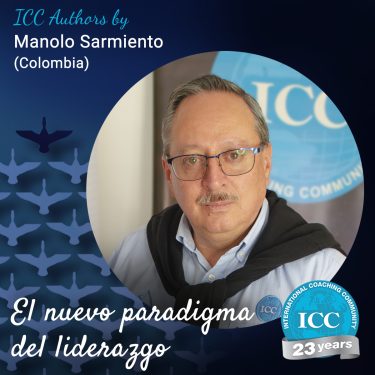
The New Leadership Paradigm: Transforming beliefs of Authority and Power
by Manolo Sarmiento, ICC trainer from Colombia
In the corporate sphere, leadership has traditionally been linked to two fundamental aspects: authority and power. For a couple of decades in my professional activity as a Coach and Organizational Consultant, I have observed that these elements have been considered essential pillars to successfully lead teams and organizations. However, the landscape is changing. Today, effective leadership demands an evolution toward a more empathetic and human approach, which poses a significant challenge: How can a leader strengthen his or her emotional skills without losing the traditional attributes of authority and power?
The Fear of Losing Power
For many leaders, the transition to a more empathetic style raises concerns. There is a fear that showing vulnerability and understanding could be interpreted as a sign of weakness, which could erode your authority and ability to influence. This fear is not unfounded; In highly competitive environments, the perception of power is crucial to maintaining team respect and trust.
The Challenge: Balancing Empathy and Authority
The real challenge lies in finding a balance. Empathy should not be seen as opposed to authority, but as a complement that can enrich leadership. A leader who is able to understand and connect with the emotions and needs of his/her team can inspire greater loyalty and commitment, which in turn strengthens her position of authority.
A Tool for Transformation
Throughout these almost 20 years accompanying managers, directors and, in general, high-level leaders, I have observed the change in the leadership paradigm of authority and power to empathetic leadership, where a closer and friendly relationship between these leaders and their teams prevails.
Coaching has become the most powerful tool that has allowed me to accompany dozens of leaders in their transformation processes towards more empathetic leadership, in which they understand that they do not have to sacrifice their authority or power. Through coaching, leaders have been able to develop the necessary emotional competencies, learning to integrate these skills with their own leadership styles.
Benefits of Coaching for Leadership Transformation
Although coaching is the instrument of transformation, providing clarity about emotional intelligence and bringing it to the field of action has been my most efficient strategy in my experience accompanying so many leaders in their challenges of change towards the new paradigm. In this sense, I want to point out four fundamental concepts that have been successful in my coaching processes for organizations:
– Self-awareness: Coaching has helped me in my guidance to encourage leaders to explore their own emotions, strengths, and areas for improvement, promoting greater self-awareness.
– Development of Communication Skills: Through coaching I have accompanied leaders to improve their ability to communicate effectively and empathetically at all levels. I have even seen this transformation in their personal environments such as home and family. This has been wonderful because I can see that the human sense prevails even in leaders with the highest positions.
– Promotion of Active Listening: Coaching has made it much easier for me to guide leaders in adopting active listening techniques, which are essential for understanding and adequately responding to the needs of their teams.
– Adaptability and Resilience: Coaching has allowed me to help leaders develop the flexibility necessary to adapt to different situations and role, position and personal challenges in surprising ways.
Maintaining Authority and Power
The power to decide and transform, and the authority to lead and drive the organization towards results strategically, do not need to change. What must change is the paradigm, thus redefining these two attributes.
In my role as a coach, I have identified three key principles for shifting the leadership paradigm:
1. Establish Clear Boundaries: Being empathetic does not mean allowing inappropriate behavior. Clear boundaries are necessary to maintain order and productivity.
2. Make Firm Decisions: Empathy must be accompanied by the ability to make difficult decisions when necessary. Firmness in decision-making strengthens the perception of leadership.
3. Demonstrate Consistency: Leaders must be consistent in their behavior and in the application of rules. Consistency generates trust and predictability.
My Learnings
Leadership in the new millennium requires a combination of empathy, authority, and the strategic use of tools like coaching. Leaders who manage to integrate these aspects not only maintain their power but also strengthen it by creating more committed and resilient teams. The challenge lies in embracing the new paradigm without abandoning the attributes that have defined effective leadership over time.
Two Challenges:
One for my colleagues: Reflect on how you are supporting leaders in their coaching processes to strengthen these dimensions in their leadership styles.
Another for the leaders who have kindly read this article: Reflect on how you are incorporating socio-emotional skills into your interactions and leadership styles.
Manuel Sarmiento is an ICC trainer from Colombia, a Lambent UK international trainer for ICC certifications in Colombia, Panama and Canada, and an organizational consultant and facilitator at REMA Consultores.
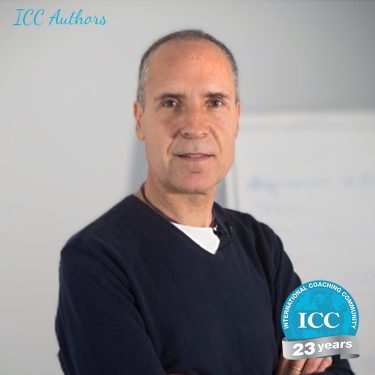
How do coaching and spirituality connect? – Making art of your life.
by Daniel Álvarez Lamas, ICC trainer from Spain
Reflecting through coaching on what truly makes you happy, you begin to question numerous habits of action, thought, and emotion that you once considered intrinsic to yourself but are not actually so.
Coaching cultivates the muscle of awareness, of ‘realizing,’ of awakening. Thanks to this, little by little, you start to live the same experiences in a radically different way.
You no longer value your own opinion just because it’s yours, but you enjoy listening to others’ perspectives. You listen with the same curiosity you had when traveling to discover new countries. You are filled with a passion for immersing yourself in other people’s worlds, understanding them in ways you never imagined. You feel humanity within you as an amazing phenomenon that you share with every person.
Thanks to coaching, you stop feeling tossed around by emotions and begin to admire them. They are as powerful and fascinating as a wild horse!
Now, by balancing your emotional world, you can observe and enjoy it in the light of your consciousness.
There are still many habits left to tame. I can perceive the telluric current of instincts and conditionings that limit my being, and now I know I have the freedom to let go.
Coaching allows me to calmly and curiously relate to those limitations of my self. It resembles my relationship with a friend whom I appreciated but needed patience for because of the eccentricities that occasionally arose. With that person, I used my understanding, affection, and good humor, downplaying the trivial while remaining steadfast when necessary. We always ended up understanding each other. That friend became very dear to me.
Similarly, I am on the path to forging a deep friendship with my younger self, ultimately learning to love myself as I deserve, embracing the eternity of which I am a part.
Daniel Álvarez Lamas is an ICC trainer from Spain, an expert in mental training, meditation, life coaching, high performance and well-being. Founder of the Ben Pensante Institute.
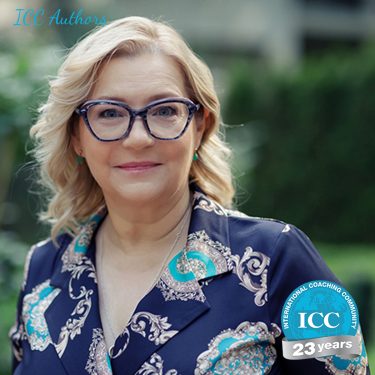
The complexity of the system, or discourses in organisational coaching
by Kasia Radii, ICC trainer from Poland
In today’s BANI world, where the flexibility of an organisation often determines its survival, in order to manage efficiently, one must first of all understand the complexity of the system that the organisation is. One of the key elements of understanding systemic complexity is organisational discourse. “A discourse is a set of normative assumptions that are unquestionable, taken for granted and that influence the way we think about everything we think about.” Discourses determine our thinking; we cannot think outside of them. Organisational discourse , like human beliefs, supports or constrains actions. Awareness of the role of discourse makes it possible to effectively design not only implementations, but more importantly coaching processes leading to the organisation’s transition through change. Indeed, in the work of the manager, and the coach working with him or her, it is important to perceive the discourse or discourses present in the organisation and to understand the resulting assumptions. There are several important paradigms regarding organisational discourses:
– discourses have their strengths and weaknesses,
– discourses should not be treated as correct or not,
– discourses simply exist and represent a wider social phenomenon
– organisations can function according to one or more discourses at the same time
InnerMastering®, based on systemic principles while taking into account the work of C.Graves, D.E.Back and Ch.C.Cowan (Spiral Dynamics theory), V.Frankl and K.Popielski, as well as its own research, describes eight basic discourses of organisations: the discourse of grounding, the discourse of community, the discourse of courage, the discourse of reliability, the discourse of passion, the discourse of synergy, the discourse of innovation, the discourse of harmony.
These discourses take into account:
– the diversity of levels of consciousness based on value systems,
– the level of competence in the organisation and the specificity of its activities,
– the type of energy, intrinsic motivation of the people in it,
– the way of defining and level of well-being in the organisation.
Each of these elements can influence the discourse of the organisation, and each can be an element of change. When looking at value systems, it is worth noting that, on the one hand, values related to the efficient and effective operation of the organisation are important, while, on the other hand, an important source of values in organisations is the needs of the people employed in it. In practice, this means that each person employed in the organisation brings his or her individual value system to the organisation, which creates a certain level of consciousness, which naturally influences the way he or she performs his or her role in the organisation (behaviour, rituals). Each person belongs to a team (department, project) creating with other members of that team, often an unwritten value system, which translates into a jointly created discourse. The teams, in turn, create the discourse of the organisation.
However, key to the organisation’s discourse are the specifics of the organisation’s activities and the level of systemic awareness (complexity) of the manager(s) who manages the organisation and creates, through their value system, the conditions for the development of various qualities.
The first division of discourses is related to the promotion of teamwork or the creation of space for the individuality of each employee.
Among the discourses oriented towards individuality, we can mention the following:
– grounding
– courage
– passion
– innovation
Among the discourses promoting teamwork we can distinguish:
– community
– fairness
– synergy
– harmony
The organisation’s discourse determines not only the way the organisation functions, but also: the layout of the organisational structure, the attitude towards people, the motivation system, the role of HR, the role of other managers and employees. All these elements are systemically interconnected and interdependent.
Every employee, when carrying out daily tasks, filters them through his or her own world of values: someone in a consistent way, someone else creatively, someone with respect for people, someone else supporting development, someone reliably and accurately, another efficiently and quickly. In this way, by theoretically doing the same things as others do, we add our contribution, our feature, our characteristic to the tasks at hand. Everyone likes to work in a way that is characteristic of them, in an atmosphere that is conducive to them, with which they are consistent. So, some need more peace and quiet, others more competition, still others access to knowledge.
When working in coaching, many of the themes that arise during sessions concern, on a meta-level, the inconsistencies between the manager’s discourse and the discourse of the organisation or the discourse of the team. These inconsistencies manifest themselves as a lack of harmony in collaboration, problems in communication, conflicts and internal dilemmas, burnout. Discourse mismatches, in the long term, result in high turnover, inefficiency resulting from inadequate action.
The multiplicity of discourses makes it possible to find the right place for everyone. It is important that we consciously shape the discourse of the organisation, know how to manage it through adequate managerial attitudes, a careful process of selecting people for the organisation. Focusing only on substantive competences without verifying the value system and thus the level of consciousness, results in a multitude of discourses in the organisation that create chaos, confusion and inconsistency in the management system.
Therefore, no matter what our role in the organisation, whether we are the owner of the company, a manager or a rank-and-file employee, every day we bring to our company, organisation, school not only our knowledge and skills, we bring to it our values, our personality traits, our beliefs, our energy and it is these that create the discourse of our organisation. It is each of us who creates our reality with our decisions, the way we build relationships, our attitudes and values. Because it is up to each of us what we bring to the world, what organisations we build, how we relate to each other and what discourses we create…
Kasia Radii, PhD, an ICC trainer from Poland, is an expert in systemic processes and organisational discourses.
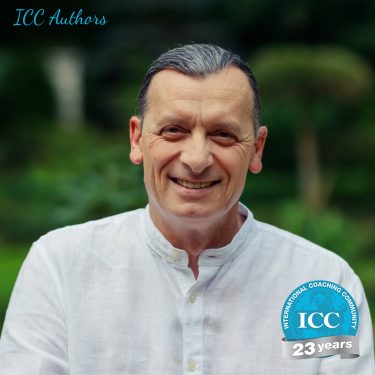
The Beauty of Coaching
by Piotr Radii, ICC trainer from Poland
Coaching is either a beautiful process or we are not coaching.
It can be a challenging process, at times difficult, puzzling, shocking and even ‘painful to discover’, but it is always a beautiful process. This is characteristic of true Coaching.
Why is this so?
There are several issues.
- It is a Living Process. It cannot be planned in a strict sense. It surprises again and again.
- It is a Creative Process. Everyone ‘creates’ from within themselves, or rather discovers themselves again and again. There is no possibility for an outsider to become an expert.
- It is an Internal Process. And everything that happens inside us is so beautiful that it is difficult for anyone to describe. There are no words that can describe our inner experience with ourselves and our Private Universe.
- It is a Real Process. Everyone is alone with it and in it, and only with themselves. There is no reason to deceive anyone. More, there is no one to deceive – except oneself.
- It is an Individual Process. The Coach is only present through the questions asked. The Disappearing Coach – this is excellence and a difficult art.
- It is a Causal Process. Everyone decides for themselves to change or not to change. Everyone takes responsibility for their own Life. Respect for the Person and for their Sovereignty, Freedom is completely and utterly complete.
- It is a Purposeful Process. It means that it has a purpose. During the process, the goal and the means of achieving it are defined.
- It is a Conscious Process. The expansion of Consciousness is central to it. For ignorance, unawareness, is the most common cause of (most of) our problems. By gaining (expanding) our individual Consciousness we influence the Collective Consciousness, and this further predisposes us to Wisdom in action. By doing something for ourselves, we influence the Lives of Other People.
- This is a Values Process. We learn the depths of our Values, we put them in order, and through this we reach ever new dimensions – to the Value of Self, to the Living and Fundamental Value that we are, as Spiritual Beings.
- This is a Developmental Process. If one does not develop, it means that one does not want to.
- It is a Self Process. One owes nothing to anyone. If anything, it is to oneself.
- It is a Life Process, Inevitable and Natural. Even if you don’t hire yourself a Coach, Coaching is what you will go through – from birth to death.
LIFE is the best COACH. There really is no better one.
Piotr Radii is an ICC trainer from Poland.
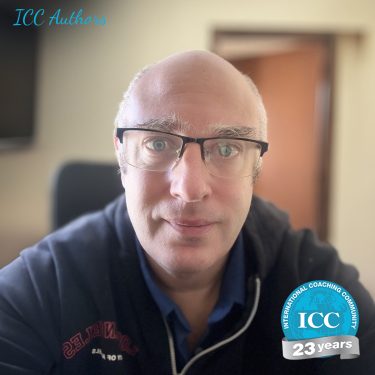
Does your leadership style inspire or simply instruct?
by Alejandro Feiges, ICC trainer from Argentina
Imagine a work environment where every question opens doors to new possibilities. Sounds ideal? It’s totally achievable! The power of questions in leadership goes far beyond getting answers; it’s about fostering autonomy, innovation, and continuous learning.
Why ask instead of order? Here are some transformative impacts of adopting the questioning approach:
- Empower your team: Questions encourage team members to think and act for themselves.
- Awaken creativity: Faced with an open question, ideas flow freely, enabling innovative -solutions.
- Develop problem solvers: Challenging questions prepare your team to face any situation.
- Stimulate personal growth: Each question is an opportunity to learn and evolve.
Tips for asking like a visionary leader:
- Clarity is key: Ensure your questions are understood to avoid confusion.
- Opt for open-ended questions: Invite detailed and thoughtful responses.
- Truly listen: Value responses to strengthen trust and communication.
- Inspire continuous reflection: The best questions resonate and generate long-term thinking.
Reflect on this: Are you creating a space where questions lead to real growth? Being an effective leader doesn’t mean having all the answers, but knowing when and how to ask the right questions.
Transform your approach, inspire your team, and lead with curiosity. Discover the power of questions today!
Alejandro Feiges is an ICC trainer from Argentina, an expert in Executive Coaching, Team Coaching, team development and facilitation, Soft Skills development for leaders, and Coaching Supervision and Mentoring.
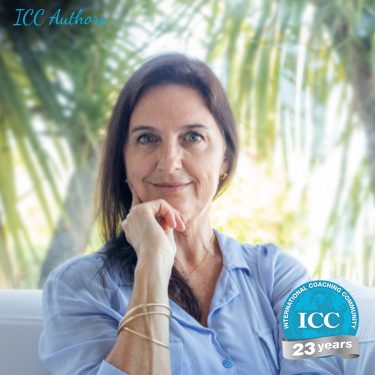
The Body Gets into the Mind and Brain
by Karina Pittini, ICC trainer from Uruguay and Chile
Did you know that the body-brain connection is key to our health and well-being? It’s fascinating how our posture, breathing, and diet can influence our emotions and thoughts!
A few days ago, during a conference, an interesting question arose: “Isn’t it the brain that gets into the body?” This sparked a passionate debate! Most people believe the brain is the control center, but modern neuroscience shows us that the body also deeply influences our mind and brain.
- Good posture can change your emotional state.
- Conscious breathing can calm your mind.
- A diet rich in fruits, vegetables, and fiber improves your mood and energy.
Try this for a week! Change your diet and note how you feel. You’ll notice more energy and a better mood. And if you revert to processed foods, observe the impact.
Share your experiences with us in the comments!
The mind-body-brain interaction is a two-way street. I invite you to continue exploring and learning together about each habit that leads us to well-being.
Karina Pittini is an ICC trainer from Uruguay and Chile, Director of the HCC Academy. She is a psychologist, coach, columnist, and speaker. She is pursuing a master’s degree in Psychoneuroimmunoendocrinology and is an inspiring leader in human and organizational development. Passionate and committed to people, health, well-being, happiness, and development.

Do you face difficult conversations at work? Discover how coaching can be your ally
by Alejandro Feiges, ICC trainer from Argentina
Dealing with difficult conversations is a reality in any professional environment. But what makes a conversation difficult? Generally, it involves those that are emotionally charged, high-stakes, or where opinions differ significantly. Coaching can be key to navigating these turbulent waters!
What skills can a coach help me develop?
- Empathy: Understanding the viewpoints and emotions of others.
- Effective communication: Expressing your ideas clearly without provoking defensiveness.
- Emotional intelligence: Managing your emotions and responding appropriately to the emotions of others.
- Negotiation: Seeking solutions that benefit all parties.
What exactly is a difficult conversation?
A difficult conversation is one where the topics are important, emotions are running high, and the outcomes have a significant impact. These can include discussions about performance, disagreements on strategic direction, or even feedback conversations.
How does coaching work and what models can I use?
Coaching employs various models to prepare you for these situations:
- Crucial Conversations Model: Teaches you to identify when a conversation is becoming critical and how to keep it on track.
- SBI Model (Situation-Behavior-Impact): Helps structure feedback to discuss specific behaviors and their impact, avoiding generalizations and judgments.
- Active Listening Model: Emphasizes the importance of listening to fully understand, not just to respond.
These models, along with the skills developed through coaching, equip you to handle difficult conversations with confidence and effectiveness. Transform the challenge into an opportunity to improve relationships and outcomes!
If difficult conversations intimidate you, consider coaching as a tool to strengthen your skills and face these challenges successfully. Learn to lead constructive dialogues today!
Alejandro Feiges is an ICC trainer from Argentina, an expert in Executive Coaching, Team Coaching, team development and facilitation, Soft Skills development for leaders, and Coaching Supervision and Mentoring.
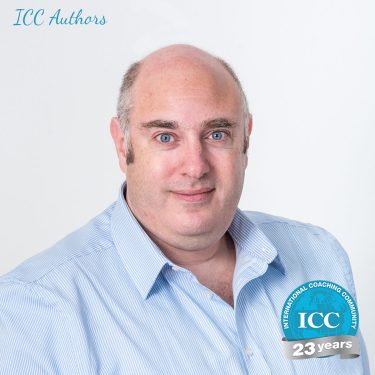
Are you ready to maximize your coaching process? Learn about the essential client commitments
by Alejandro Feiges, ICC trainer from Argentina
Often, the focus is on what a coach should do to ensure a successful process, but what about the client’s part? The client’s commitment is equally crucial for the success of coaching. Here, we explain what you need to contribute to truly make the most of your coaching process.
Key Client Commitments in Coaching:
- Self-exploration: Be willing to deeply reflect on your own behaviors, beliefs, and goals.
- Openness to change: Accept new perspectives and be willing to modify habits and thoughts.
- Time dedication: Commit time for sessions and for reflecting or practicing between sessions.
- Honest communication: Be transparent about your thoughts and feelings throughout the process.
Warning Signs That a Client Is Not Fully Engaged:
- Lack of preparation: Arriving at sessions without having reflected or completed agreed-upon tasks.
- Resistance to change: Continuously showing reluctance to discuss or explore new ideas.
- Frequent tardiness or cancellations: This can indicate a lack of commitment to the process.
- Superficial communication: Avoiding sharing deep or personal thoughts that are crucial for growth.
Coaching is a two-way journey. While your coach provides direction and support, your role is equally important to ensure that each session is a step forward in your personal and professional development.
If you are ready to commit and make the most of what coaching can offer, prepare yourself to explore, change, and grow!
Alejandro Feiges is an ICC trainer from Argentina, an expert in Executive Coaching, Team Coaching, team development and facilitation, Soft Skills development for leaders, and Coaching Supervision and Mentoring.
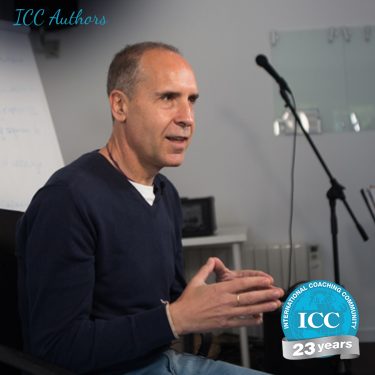
How to deliver personal development training. Using team coaching.
by Daniel Álvarez Lamas, ICC trainer from Spain
We can’t teach something as intimate as personal development using the same format we would use to explain how a computer works.
Here is my iVoox podcast with guidelines and precautions for doing it fully:
When you teach about emotional intelligence, coaching, stress management, or conflict resolution, you’re talking to people about their own thoughts and emotions—in other words, you’re explaining their own lives to them.
We must start by helping them realize the situations in their lives where they need this knowledge. Therefore, we will first help them put themselves in those difficult situations. This will be the high-vibration motivation that keeps them committed to the training and makes it something alive and dynamic.
Much more, summarized in the 11 minutes of the podcast. Enjoy!
Daniel Álvarez Lamas is an ICC trainer from Spain, an expert in mental training, meditation, life coaching, high performance and well-being. Founder of the Ben Pensante Institute.

Do you work in an organization and are considering hiring coaching services?
Discover what to look for and how to benefit the most.
by Alejandro Feiges, ICC trainer from Argentina
Business coaching has become a key tool for many organizations aiming to improve the performance and well-being of their teams. But when is the right time to hire a coach, and what should you expect from one?
Key Moments to Hire a Coach:
– Leadership development: When the company aims to enhance the leadership skills of its managers or executives.
– Organizational changes: During periods of significant change, such as mergers, restructurings, or strategic shifts.
– Performance improvement: When areas for improvement are identified in teams or individual performances.
– Conflict management: To resolve internal conflicts that affect morale and productivity.
What to Look for in a Professional Coach:
– Relevant experience: A coach with experience in the business world and specific knowledge of your industry.
– Certifications: Ensure they have recognized credentials from professional coaching organizations.
– Clear methodology: They should offer a structured approach tailored to the specific needs of your organization.
– Listening skills: A good coach must be an excellent listener and able to understand the complex dynamics of your team.
At the International Coaching Community, we are committed to training professional coaches with these characteristics, based on a solid model, a proven methodology, and the experience of professional trainers who offer quality assurance in their training programs!
Alejandro Feiges is an ICC trainer from Argentina, an expert in Executive Coaching, Team Coaching, team development and facilitation, Soft Skills development for leaders, and Coaching Supervision and Mentoring.
a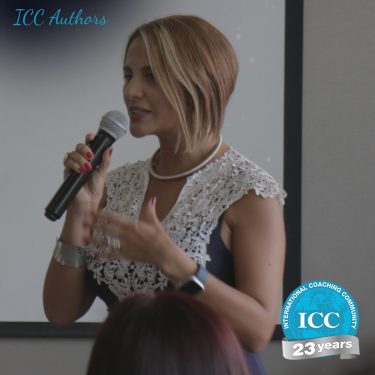
The Role of Value Judgments in Coaching and How to Manage Them
by Alexandra Niño, ICC trainer from Peru
In the coaching process, one of the fundamental principles is creating a safe, non-critical space where the coachee (client) can freely and authentically explore their thoughts, emotions, and behaviors. In this context, value judgments can become a significant obstacle to the effectiveness of the process, both for the coach and the coachee.
Understanding the role of value judgments in coaching and learning how to manage them is key to achieving deep and transformative results. First, let’s define what a value judgment is. A value judgment involves making an evaluation or criticism of a person or situation based on personal beliefs, values, or norms. In other words, it means interpreting what someone says or does from our subjective perspective, which can distort the true reality of the coachee. This type of judgment is automatic and is tied to our culture, personal history, and experiences.
In coaching, the presence of value judgments can negatively affect the relationship between the coach and the coachee. If a coach judges the coachee’s actions, emotions, or decisions, it can create a barrier that prevents openness, honesty, and self-exploration. Likewise, a coachee who harshly judges themselves may limit their ability to see new possibilities or make changes.
There are two key aspects of value judgment in coaching:
- Coach’s Value Judgment: If the coach is unaware of their own judgments, they might project their opinions onto the coachee, affecting the neutrality that coaching requires. The coach’s role is to accompany the coachee in their process of self-discovery, not impose a personal view. Judgments can manifest as directive advice, paternalistic attitudes, or subtle criticisms, weakening the coachee’s autonomy.
- Coachee’s Value Judgment: The coachee can also bring their own judgments into the process, limiting their ability to explore new perspectives or solutions. These judgments can appear as limiting beliefs, self-criticism, or prejudices about what they “should” do or be. The coach’s role is to help the coachee identify and question these judgments, fostering an open and unrestricted mindset, allowing the coachee to explore alternatives more aligned with their true values and goals.
How to Manage the Coach’s Value Judgments in the Coaching Process
Step 1: Recognize your own judgments
The first step to managing value judgments is to acknowledge their existence.
Actions
– Before each session, take a few minutes to reflect on your thoughts and emotions regarding the coachee.
– Identify if you have any preconceived opinions about their situation or behavior.
Step 2: Develop active neutrality
Once you recognize your judgments, the next step is to work on maintaining active neutrality.
Actions:
– Practice active and neutral listening.
– When a judgment arises, simply observe it without reacting or validating it, and refocus on what the coachee is sharing.
Step 3: Ask questions from curiosity
Transform your judgments into curiosity.
Actions:
– Ask questions like: “What makes you think this is the best option for you?” or “What possibilities do you see that you haven’t explored yet?”
– Avoid judgment-laden questions like: “Don’t you think this is a mistake?” or “Why didn’t you do what you said last time?”
Step 4: Practice Mindfulness during sessions
Actions:
– Before each session, do a brief mindful breathing or meditation exercise to center yourself.
– During the session, whenever you notice a judgment arise, simply observe it and let it go, returning your focus to the coachee.
Step 5: Develop continuous self-awareness
Self-awareness is the ability to observe oneself clearly and objectively, without judgment. In coaching, this skill is key to managing value judgments.
Actions:
– Keep a coaching journal: After each session, write down your observations about how you felt during the session. Were there moments when you noticed a judgment? What situations with the coachee trigger your personal beliefs or judgments?
– Example: “Today I realized that when my coachee talked about their difficulty setting boundaries at work, I felt frustrated. Why do I think they should be more assertive? Is this a personal judgment?”
– Reflect on key moments: Were there situations during the session where you found yourself thinking about what the coachee should do? How could you have approached these moments more neutrally?
Step 6: Monitor your body language
Value judgment is not only expressed through words but also through body language.
Actions:
– Observe your posture, gestures, and facial expressions during sessions. Maintain a neutral and open posture, avoiding movements that might be interpreted as disinterest or detachment.
– Use silence effectively.
Step 7: Be aware of your “blind spots”
We all have blind spots—areas where our judgments or beliefs influence us without our awareness.
Actions:
– Reflect on recurring situations where your emotions or judgments are easily triggered. For instance, if you tend to have judgments about financial or work-related decisions, this might be an area to work on.
– Engage in 360-degree feedback exercises, where colleagues or mentors can help you see aspects you may not perceive in yourself.
Step 8: Manage your personal emotions
Value judgment often arises as an emotional reaction. Practicing emotional intelligence allows you to recognize and regulate your emotions before they interfere with the coaching process.
Actions:
– Before a session, check in with how you’re feeling emotionally. If you’re stressed, upset, or anxious, take a few minutes to emotionally balance yourself before starting.
– Use emotional regulation techniques, such as deep breathing or visualization, to stay calm and objective during sessions.
Step 9: Reframe thoughts and beliefs
When a judgment arises, a good technique is to reframe or question your own thought.
Actions:
– Ask yourself: “What other explanation could there be for this situation?” or “How would I view this if I didn’t have this judgment?”
– Practice seeing each of the coachee’s challenges from different perspectives.
Step 10: Create an “anchor” to return to neutrality
A useful tool is to create a mental or physical anchor that reminds you of neutrality in coaching.
Actions:
– Choose a word or gesture that reminds you to “maintain neutrality,” like softly touching your fingers together or mentally repeating a word like “neutral” or “curiosity.”
– Use this anchor whenever you feel yourself on the verge of making a judgment.
Step 11: Remember coaching is about the coachee, not you
Finally, it’s important to remember that coaching focuses on the coachee and their path, not the coach.
Actions:
– During sessions, remind yourself that your role is to accompany the coachee on their journey, not to lead them. Constantly ask yourself: “Am I letting the coachee take ownership of their process?”
– If you feel your personal judgments interfering, mentally step back and refocus on the coachee.
Conclusion
Developing continuous self-awareness is essential for managing value judgments as a coach. Through self-evaluation, external feedback, mindfulness, reviewing your values, and practicing metacognition, you can maintain a state of active neutrality and curiosity during coaching sessions. Over time, these practices will help you manage your judgments more effectively and create a safer, more open space for the coachee’s growth.
Alexandra Niño is an ICC trainer from Peru, an expert in purpose, creativity, possibility, disruption, and also in AI in the field of Human Development.

